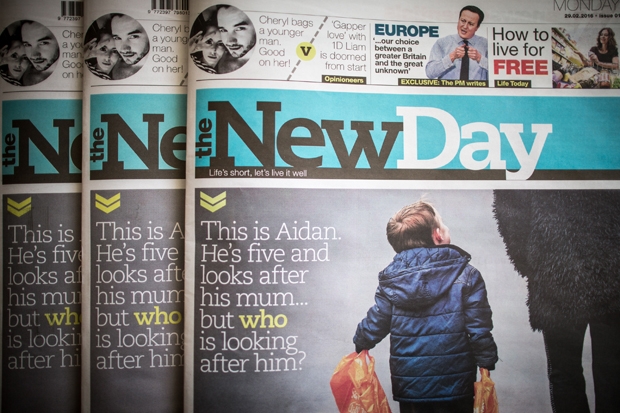On Monday I went to the newsagent to buy the newspapers and picked up the first issue of a new one calling itself the New Day. This is the creation of the company that publishes the Daily Mirror, and it is, the publishers say, intended to appeal to people who have given up reading newspapers, people now so numerous that they are rapidly bringing the industry to its knees.
The paper’s rather odd title is reminiscent of the carefree song ‘Many a New Day’ from Oklahoma!, and it is presumably intended to emphasise what the publishers call its ‘optimistic approach’. ‘We like to think we’re a modern, upbeat newspaper for modern, glass-half-full kind of people,’ writes its editor Alison Phillips in her introductory letter to readers. ‘We know life is often difficult and sometimes painful. And we’ll reflect that,’ she goes on. ‘But we want to have a laugh too. Life’s too short not to.’ ‘Life’s short. Let’s live it well’ is also the paper’s slogan.
It is exciting to find a new newspaper being published at a time of such trouble for the press, but how does the New Day intend to survive? It says it hopes to settle down profitably with a sale of around 200,000 copies a day at a cover price of 50p; but if it’s going to appeal to people who don’t like newspapers, it must clearly be very different from those already on sale, and in this it does not disappoint. For one thing, it promises to be politically neutral and to let its readers form their own opinions. (It publishes no leading articles, for example.) For another, to judge at least from the first issue, it does hardly any original reporting.
There is an ‘exclusive’ ‘top story’ about thousands of children aged between five and seven being made to become carers for disabled parents or relatives because of cuts in social-care budgets. An alarming situation, indeed, but seemingly one exposed only as a result of an ‘exclusive’ reading of a report by a charity called Carers Trust — a report that is available for anybody to read on the charity’s website. The rest of the paper is filled with opinion columns, explanatory briefings, and snippets of news probably lifted from news agencies or similar sources.
The paper’s impartiality is shown by taking an issue, such as Theresa May’s ‘snooper’s charter’ (the somewhat less than impartial phrase it uses to describe her Investigatory Powers Bill), and publishing ‘for’ and ‘against’ articles about it. But in the case of the EU referendum the balance is rather more lopsided, with an anti-Brexit article by David Cameron set against one by an ‘undecided mum-of-two’ from London saying she needs more information in order to make up her mind. An extra fillip to the pro-EU cause is given by a news item claiming that The Gruffalo children’s book would never have happened if its German illustrator, Axel Scheffler, had not had the right to study in England.
One wouldn’t read the New Day for its coverage of world events, since there hardly is any, so what would one read it for? For laughs? For entertainment? For stimulation? For controversy? I wouldn’t, anyway. The only reason I can think of to read it is to find out how ‘modern, half-glass-full kind of people’ think and talk. Take this opening sentence of its coverage of the Oscars: ‘The whole lack of racial diversity clanger had the Oscars’ organisers waking in a clammy sweat.’ Or this, by a writer defending the right of Cheryl Fernandez-Versini (formerly Cheryl Cole) to take a lover ten years younger than herself: ‘Cue horror and disgust on the forums from judgmental idiots who’ve probably never even had a relationship, let alone one with an age gap.’
I’ve no wish for the New Day to fail, but if it succeeds, it will be evidence not of the durability of the daily newspaper but of its perhaps irreversible decline. For the New Day is not a newspaper; it is something else altogether. And for some reason it left me feeling very depressed. I went last weekend to a new, musically accomplished youth opera at Glyndebourne called Nothing. The story was about a schoolboy who dismayed his classmates by suddenly announcing that nothing in the world mattered and resisted all their efforts to show him that some things did. In the end, they just put him on a bonfire and burnt him to death. Reading the New Day, I began to feel a bit of a nihilist myself. So I’d better stop reading it. Life’s too short.






Comments